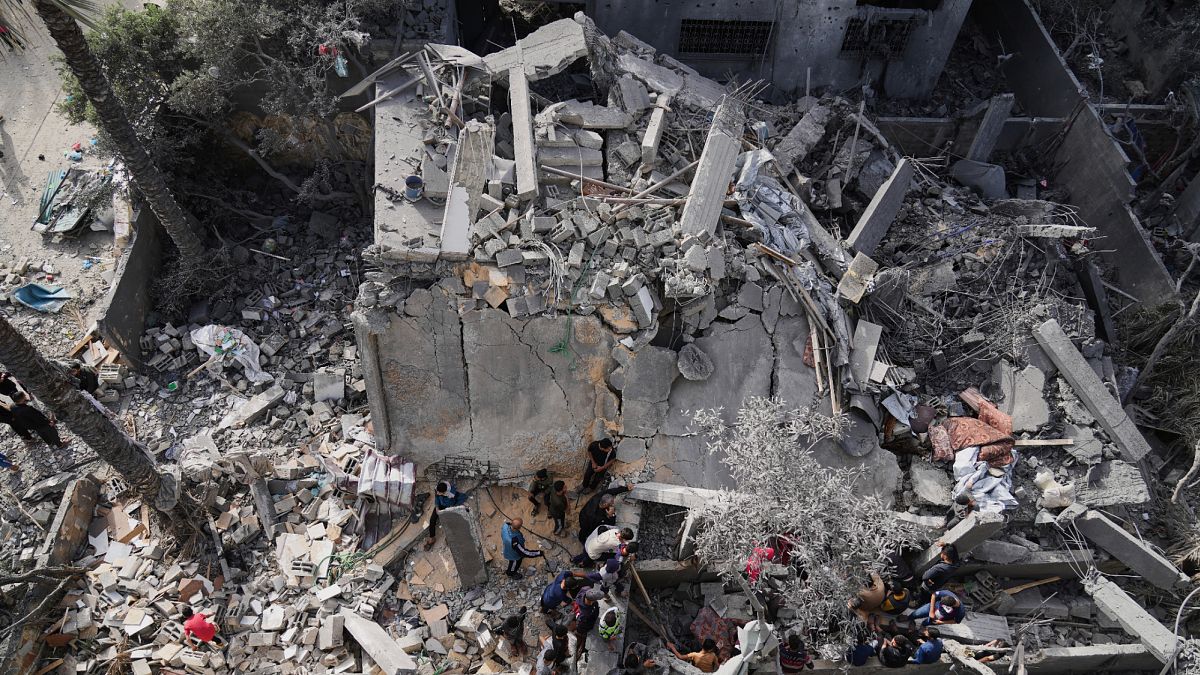Protesters were out on the streets of cities such as Rome and Lisbon to denounce the Russian invasion which the UN estimates has killed or wounded more than 35,000 civilians since February 2022.
Italy
Protesters in Rome have gathered in support of Ukraine as the 1,000th day since the Russian invasion in February 2022 approaches.
People from Italy's Ukrainian community were joined by Italians and other foreign nationals living in the country to stage a rally just a few hundred metres from the Russian embassy in Rome.
Many protesters wore Ukrainian flags and held banners and placards calling for a stop to the invasion.
They also held a religious ceremony and observed a moment of silence for fallen Ukrainian soldiers.
"There must be a just peace. We cannot forgive all that Putin has done during all these years, not just from 2014 but also before. He never let us live in peace, so we cannot and we will not forgive, we cannot surrender, for the sake of our future," said Maria Meleshko, a Ukrainian living in Italy.
Since Russia's all-out invasion of its smaller neighbour in 2022, Europe's biggest armed conflict since World War II has cost tens of thousands of lives on both sides.
Thousands of Ukrainian civilians have been killed in the fighting while others have lost their family, homes and livelihoods.
"As it happened in the past already, this conflict cannot end as things stand today, maybe it will be frozen but then tomorrow it will start again and be even worse," said another protester, Emanuele Pinelli.
"The only way it could be over is to completely deplete the military means of the Russian Federation and topple the Russian regime, then it will be over."
Portugal
There were similar scenes in Portugal with dual pro-Ukraine rallies in the capital Lisbon and in the city of Porto.
Demonstrators held Ukrainian and European Union flags and demanded an immediate ceasefire in the country.
"We know that the United States can help Ukraine in a strong way so that Ukraine can remove Russian troops from its territory," said Pavlo Sadokha, the president of the Association of Ukrainians in Portugal.
Finland
Meanwhile in the Finnish capital Helsinki, it was Russian nationals on the street protesting against the war in Ukraine.
Around a hundred protesters urged the governments of Finland and other European countries to continue supporting Ukraine, regardless of any potential change to US policy under incoming US President Donald Trump.
Protesters chanted 'Victory for Ukraine, peace to Europe, Putin to prison!' as they marched to the Russian Embassy where they demanded the immediate withdrawal of Russian troops from Ukraine and the release of political prisoners.
"I am here to show the Finnish and also the European society that there are many Russians who do not support the [Putin] regime and who do not support this terrible war and also to show the people of Russia that they are not alone," said Russian national, Daria Drobysheva.
Czech Republic
But it was a protest of a different kind in the Czech Republic where around 200 people gathered at the National Museum in Prague to oppose the government’s stance on sending aid to Ukraine.
The rally was called by activist Ladislav Vrabel and a counter-protest in support of Ukraine was held nearby.
Prague police said they were monitoring the situation.
Since the Russian invasion, the Czech government has been a staunch supporter of Ukraine, providing the country with both humanitarian and military aid.
The Ministry of Defence said in a statement last year that Prague had sent military aid worth more than 4 billion Czech Koruna (€158 million).
Speaking at a working dinner with the leaders of the Netherlands, Denmark, Poland and Latvia in May, Czech Prime Minister Petr Fiala said aid to Ukraine would continue.
"Russia's aggression against Ukraine clearly shows that we must support the development of the European defence industry and enhance our defence capabilities. This is a key priority for Europe’s long-term security," he said.

 4 months ago
42
4 months ago
42






 We deliver critical software at unparalleled value and speed to help your business thrive
We deliver critical software at unparalleled value and speed to help your business thrive






 English (US) ·
English (US) ·